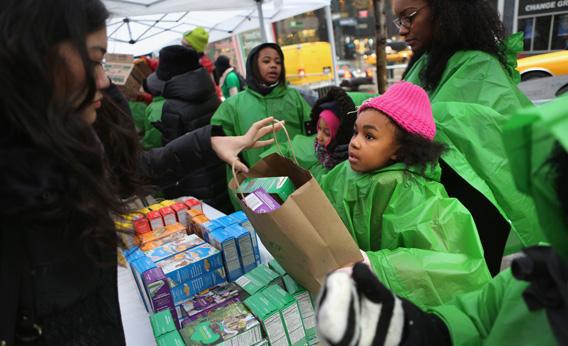Alana Thompson, the 7-year-old star of Here Comes Honey Boo-Boo, stopped selling Girl Scout Cookies via her Facebook page after the Girl Scouts of Historic Georgia, a regional council, complained. Thompson is not a Girl Scout but was selling the cookies on behalf of a friend. Why are the Girl Scouts so controlling about who can sell Girl Scout Cookies? Because selling Girl Scout Cookies is supposed to be an entrepreneurial learning experience for Girl Scouts. According to the Girl Scouts of the United States of America’s website, selling cookies helps Girl Scouts develop five skills: goal setting, decision making, money management, people skills, and business ethics. Girl Scouts may either sell cookies directly to consumers (by going door-to-door in their neighborhoods, calling relatives, or dropping in at their parents’ office, for example) or participate in booth sales at retail locations or other public areas. By selling cookies, Girl Scouts are eligible for several badges representing specific achievements related to the five skills, and they may also earn tokens known as “recognition items” for their sales efforts. The Girl Scout Cookie program is a major source of funds for the nation’s 112 Girl Scout councils, each of which is in charge of organizing cookie sales for its region. Forty to 60 percent of the sticker price of each box goes into council coffers, and an additional 25 percent is invested into the troop that sold the box. The national Girl Scout organization strongly discourages buying cookies sold by anyone other than a Girl Scout, since they can’t “guarantee the freshness or origination of these cookies” and since “purchasing cookies in this way does not support girls participating in the cookie program.” The Girl Scouts of the United States of America, the umbrella organization that oversees regional Girl Scout councils nationwide, has a policy prohibiting online sales of Girl Scout cookies because it has not yet developed a platform through which Girl Scouts can sell cookies safely and legally. (Girl Scouts over the age of 13 are, however, allowed to use Facebook to alert their friends and acquaintances of the locations of booth sales.) Most of the other regulations surrounding the sale of Girl Scout Cookies are determined by each council. The national Girl Scout organization provides marketing support to councils from January through April each year, so most councils hold their cookie sales in the spring. Sales typically last between 12 and 16 weeks; councils limit the length of each sale period to make sure Girl Scouts have time to devote to other projects for the rest of the year. Two bakeries, ABC Bakers and Little Brownie Bakers, are licensed by GSUSA to bake Girl Scout Cookies. Each regional council negotiates prices, sales terms, and delivery agreements with one of the two bakeries. (In previous decades, more bakeries were licensed to produce Girl Scout Cookies, but they have either closed or consolidated.) The dual bakeries are the reason some Girl Scout Cookies go by more than one name: Little Brownie Bakers produce Samoas, Tagalongs, Do-si-dos, and Trefoils, while ABC Bakers make Caramel deLites, Peanut Butter Patties, Peanut Butter Sandwiches, and Shortbread. Although only Girl Scouts may sell Girl Scout Cookies, the Girl Scouts of the United States of America has entered into short-term licensing agreements with other companies in the hopes of promoting the Girl Scout Cookie brand without damaging Girl Scout Cookie sales. For instance, this year Breyer’s is selling limited-edition Girl Scout Cookie-flavored frozen desserts; in the past, Dreyer’s (known in some parts of the country as Edy’s) has produced a similar product. Crumbs Bake Shop also made a limited-edition Thin Mints cupcake last month, and Nestlé made limited-edition Girl Scout Crunch cookie bars last summer. Got a question about today’s news? Ask the Explainer. Explainer thanks Amanda Hamaker of the Girl Scouts of the United States of America.
Tagalong Haul
Why are the Girl Scouts so controlling about who can sell their cookies?

Photo by John Moore/Getty Images
Advertisement